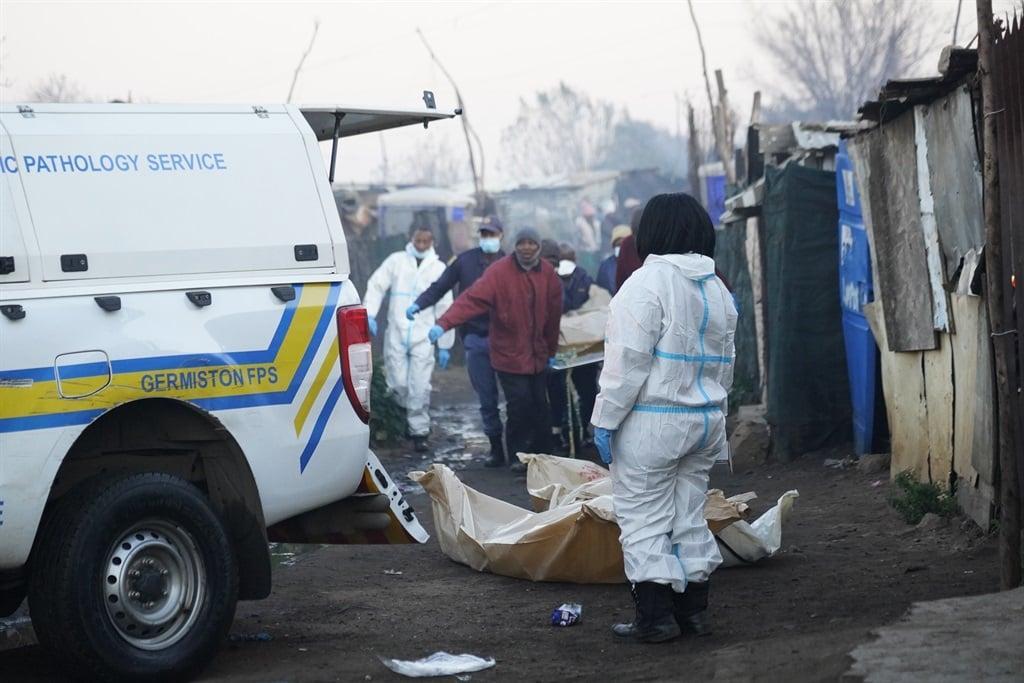Africa-Press – South-Africa. A group of illegal miners in Boksburg has bid farewell to one of their own who died following last week’s gas leak.
Zama zamas, as illegal miners are known, gathered at a gravel soccer pitch at the Angelo informal settlement, where the body of Syfred Sebyeng, 56, arrived in a white hearse on Tuesday.
The convoy then stopped at the spot where Sebyeng died on the night of 6 July, where rituals were performed to “collect his soul” to be taken to his final resting place in Bochum, Limpopo.
At his home, more rituals were performed over the noise of nearby illegal mining machinery.
Most of the backyards where the final processing of the precious metal by illegal miners happened were covered with plastic sheets to prevent people from seeing what was happening on the property.
Illegal miners softly sang hymns and walked behind the hearse as it left the settlement before returning to their “plants” – the word used by locals to describe the backyard sites where the final processing of gold take place.
“He was working with them. They loved him. They promised his family that they would assist with his burial. They are here to bid him farewell,” a resident told News24.
“Why would zama zamas stop their machines and sing for him? He was one of them.
After the service, the illegal miners returned to “work”.
Young men were seen going to a nearby petrol station carrying plastic containers to buy fuel to operate their machinery.
Sebyeng’s cousin, Tshepi Manaka, said he died when he attempted to save his neighbours from the toxic gas that claimed 17 lives, including eventually his own.
Manaka said:
“I saw his body lying on [the] street. I saw blood coming from their [neighbours’] noses and mouths,” Manaka added.
He and his friend, Samuel Malaza, switched off the leaking gas canister at a home where gold was being processed.
Sebyeng’s sister, Juliet Manaka, said his death had shocked them.
“He was not sick. He was a healthy man who loved jokes. He was our family’s entertainer. We are here to bid him farewell. We loved him dearly,” added Juliet.
Relative Collen Sebyeng said: “We are hurting. We can’t say it was his time to die. We want to know why he died. He was there to help people. We will never forget him. This incident will never be forgotten.”
DA Gauteng leader Solly Msimanga visited the area to speak to bereaved families.
Four of the 16 victims were from Zimbabwe and 12 were Mozambican nationals.
Msimanga said illegal mining posed a danger to the country.
“The illegal miners are back, and we might have another disaster in a matter of time. There is a big economy around the mining industry. We need to regularise small-scale mining. Tanzania is doing it successfully.
“We were promised that there would be policing around illegal mining in the area.
“Our police are not equipped to deal with illegal miners, including tracking them underground,” he added.
“We are sitting with an unfortunate situation where 70% of residents here [at the Angelo informal settlement] are not South African.
“We can’t give them permanent stands and housing. We need to look at issues of border control. How do we avoid illegal migration taking place in our country?
“We cannot only react when people are already here, and such disasters are taking place. This is a vicious circle. Police were promised, and they are not here. This matter must be taken seriously.”
Under siege
During his visit to the area, Gauteng Premier Panyaza Lesufi said the province was under siege from illegal mining.
“We are using outdated law enforcement mechanisms in a new area that needs new forms of enforcement. We must overhaul our law enforcement response.
“Illegal mining is out of control. We need a specialised way of training our specialised law enforcement,” Lesufi said.
He added the government must confront illegal mining head-on.
“I am calling for a completely new strategy in confronting illegal mining.”
Gauteng police commissioner Lieutenant-General Elias Mawela said the informal settlement was used as a gold processing area by illegal miners.
Mawela added zama zamas processed the materials at their homes.
Residents claimed the lethal gas, which claimed 17 lives last week, smelt like rotten eggs.
The police later raided homes and confiscated gas canisters known as phendukas as well as machinery used to process gold.
The canister that caused the deaths was being turned into a phenduka by being cut open in the middle where a steel ball was placed inside to grind gold-bearing soil.
The majority of phendukas are operated either by generators or illegal electricity.
For More News And Analysis About South-Africa Follow Africa-Press






